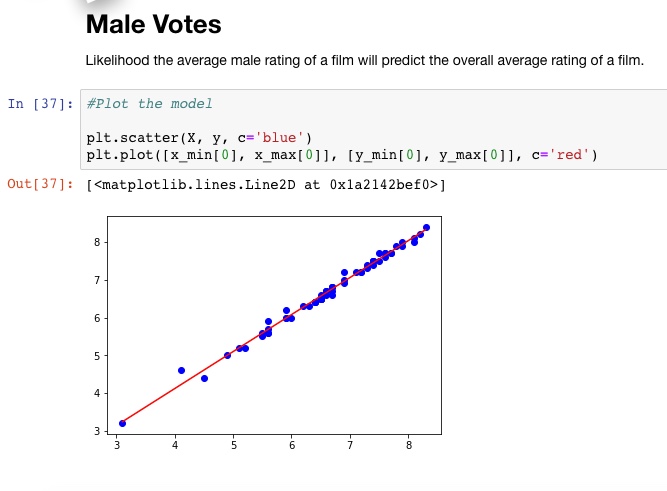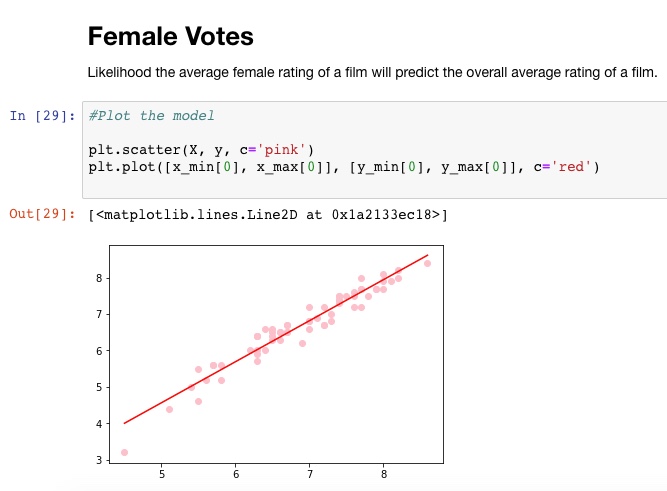What do the gender pay gap and movie rating giant IMDb have in common? Women are likely to be undercut in both areas. Just as women are less likely to negotiate their salaries when they receive a job offer, due to an often misunderstood series of internal and external factors, they are also less likely to cast their votes on IMDb—and more female votes could dramatically impact a movie's overall rating. Eighty-six percent of the votes that inform a movie's overall average rating come from male viewers. Yet, 52% of movie-goers are female. What's the impact? Women tend to rate movies more favorably than males do. Here's a look at how this impacted 2017's biggest films.
Even though women make up the majority of movie-goers, it turns out male voters more accurately predict what a film’s overall rating will be, as you can see in the linear regression models below. See the full notebook for the charts below on Github.
(screen-captures from the full project):
See the full notebook for the charts above on Github.
Which, of course, prompts the question: “Why?” To scratch the surface of this exploration, I took a look at 64 movies released in 2017. These include the top 40 most reviewed movies by IMDb voters, the top 40 grossing movies, and the bottom 20 ROI generating movies produced by major studios. When you take a closer look, it becomes quite clear: far more males than females rate movies on IMDb.
And their opinions aren’t always the same. Female reviewers tend to vote films more favorably.
The chart below shows the disparity between male and female voters for each movie in the data set. In 55 of 64 movies, female voters rated the movie differently than male voters.
In addition, I threw critic reviews based on Metacritic scores as reported in IMDb in the mix. I found that male voters and Metacritic reviews are more aligned OVERALL. This is a fact a lot of blogs media sites love to bring up. So it is important to note this is influenced by consistency movie to movie. A few outliers made a big difference. There were a few movies with large disparities between female voters and critics that affected this average in this data set. It is worth noting that this disparity between female voters and critics’ official reviews is more CONSISTENT that the disparity between male voters and critics’ official reviews. In other words, female voters are consistently lower than critical reviews—in addition to being consistently lower than male voters.
Why? One possible explanation is that the majority of established movie critics are males.
Key Takeaways:
Average ratings on IMDb may not always reflect the overall opinion of the actual audience. In fact, it may under-represent how audiences feel about a film. Keep that in mind next time you use IMDb to make a movie-watching decision.
Could this disparity help better predict whether a movie will rate well on IMDb? I explored predictive analytics projects that sought to predict—based on a variety of factors—how well a movie would score in IMDb. These factors influence the real audience, though, and not only the skewed sample that provides ratings in IMDb. And, interestingly, I didn't see votes by gender in the data sets associated with these projects. Accounting for gender respresentation, along with other demographic data, could make other make predictive analytics projects stronger.
Should IMDb do what pollsters do, and adjust their sample to reflect the reality of the world? Leaving things unadjusted means roughly 86% of the final outcome is decided by male voters, though male voters do not make up 86% of movie-goers. Or, should IMDb data be left as pure and transparent as possible, and rely on the voting public to be responsible for the outcome? That perhaps depends on whether you are looking for election results or information about how audiences received a film.

